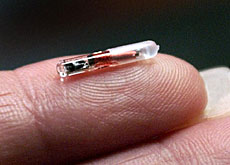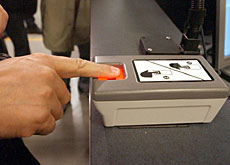Big Brother threat hangs over Switzerland

The head of Switzerland’s data protection commission has said he is concerned that Switzerland is in danger of turning into a police state.
Hanspeter Thür said he also feared another “secret files scandal” if planned revisions to the internal security law were accepted, clearing the way for the bugging of telephones.
At the end of the 1980s a scandal over secret files held by federal authorities rocked Switzerland and prompted an official parliamentary investigation.
At his annual conference on Friday, Thür said he had not been sufficiently convinced that criminal prosecutors needed more powers.
“I have received no proof that we have to take further measures to ensure the security of the State,” he commented.
Thür said it would be dangerous if security services were allowed to gather preventive information secretly, as they would never have to defend the validity of such methods in fair or open proceedings.
He also regretted the thoughtless way in which new and increasingly complex information technologies were handled and the seemingly carefree attitude towards microchips.
Potential for abuse
As an example, Thür said that video surveillance and biometric data both had a considerable potential for abuse.
He explained that professional address traders in the United States could provide lists of people who use anti-depressants, who believe in the Bible or who gamble online.
Thür said he believed that some countries were increasingly seeking greater control and surveillance.
As a result of the “I have nothing to hide” mentality, the creation of a comprehensive DNA database had been put forward, which, according to Thür, went against the fundamental principle in a free society of the presumption of innocence.
He said this trend has drastically increased as a sign of the fight against terrorism. Thür expressed doubts, for example, about the appropriateness of compulsory registration of pre-paid SIM-cards for mobile phones.
Scandal
In 1989 a parliamentary investigating committee discovered extensive card indexes and files in the offices of the Swiss Federal Prosecutor.
It turned out that during the Cold War the Federal Police had placed more than 700,000 people and organisations in Switzerland under surveillance and had secret dossiers prepared on them.
By the middle of the 1990s, most of these documents had been transferred to the federal archives. More than 320,000 people requested access to the files and state security material.
swissinfo with agencies
Hanspeter Thür, the head of Switzerland’s data protection commission, has criticised the general carefree attitude regarding microchips.
He also warned that Switzerland is in danger of turning into a police state.
Some of the uses of microchips foreseen by Thür:
Chips could be fired by watercannons at crowds, who would then inhale them.
Implanted chips could identify people with criminal records or illnesses.
Larger chips in an upper arm could be used to pay for drinks.

In compliance with the JTI standards
More: SWI swissinfo.ch certified by the Journalism Trust Initiative


You can find an overview of ongoing debates with our journalists here. Please join us!
If you want to start a conversation about a topic raised in this article or want to report factual errors, email us at english@swissinfo.ch.